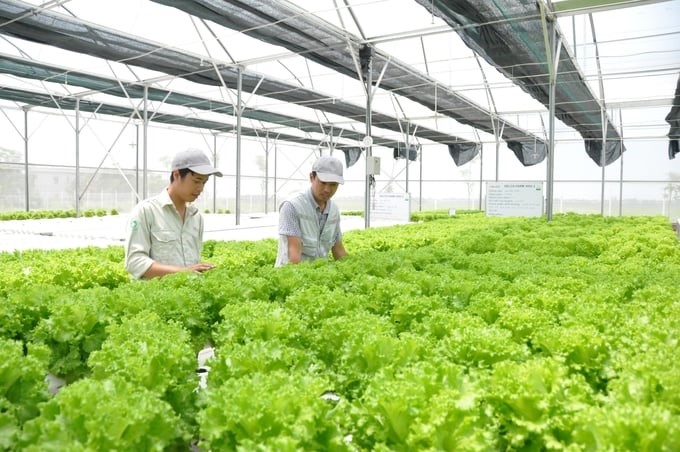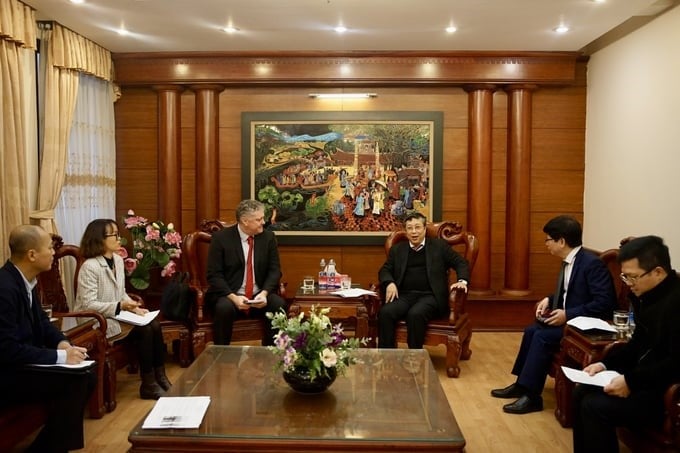June 15, 2025 | 08:24 GMT +7
June 15, 2025 | 08:24 GMT +7
Hotline: 0913.378.918
June 15, 2025 | 08:24 GMT +7
Hotline: 0913.378.918

Launching a cooperation project between Vietnamese - Australian agricultural businesses.
On February 27, Beanstalk AgTech announced a bilateral cooperation strategy between Australian - Vietnamese businesses on climate-smart agriculture (CSA) in the shrimp and rice industries.
The strategy is part of the Australia-Vietnam Enhanced Economic Engagement Grant (AVEG) Program for Climate-Smart Agriculture, organized by Beanstalk AgTech with support from the Mekong Business Initiative (MBI) Organization and funded by the Australian Department of Foreign Affairs and Trade.
The Vietnam-Australia Partnership Program for Climate-Smart Agriculture will take place from March 18–22 in Vietnam and from May 6–10 in Australia.
The program’s purpose is to create cooperation opportunities to develop sustainable value chains in Vietnam's agriculture sector, particularly focusing on the rice and shrimp sectors.
According to Ms. Lily Tao, Project Director of Beanstalk AgTech, although the rice and shrimp industries bring livelihoods to millions of Vietnamese farmers, these industries are also facing risks caused by climate change, related to rising sea levels and erratic rainfall. Therefore, the approach of climate-smart agriculture is a solution to minimize the above-mentioned risks.
"Vietnam is considered one of the most vulnerable countries to climate change; therefore, the approach towards smart agriculture adapting to climate change (Climate-Smart Agriculture—CSA) together with practices and technologies brings many accessibility and market expansion opportunities, especially in demanding markets such as Europe and North America," said the Beanstalk’s representative.
However, in general, the level of application of CSA technologies in Vietnam is still low or average. The replication of CSA technologies is limited due to difficulties in accessing input factors, high implementation costs, and a lack of capital investment.
In addition, the lack of quality human resources as well as the coordination of information to guide the implementation of CSA in local development programs and plans is also a barrier in Vietnam's agricultural ecosystem.
Thanks to participating in this program, Vietnamese - Australian businesses in the shrimp and rice industries will have opportunities to cooperate and invest through visits and learning about smart agriculture.
Businesses participating in the program will visit leading farms, organizations, or research institutes to better understand challenges in the sustainability issue as well as learn about the industry’s advanced solutions.
Businesses can come up with ideas to implement the project by participating in workshops that help find potential solutions to key challenges in the rice and shrimp sectors.

Deputy Minister of the Ministry of Agriculture and Rural Development Hoang Trung (center right) met and held discussions with Agricultural Counselor Tony Harman from the Australian Embassy in Vietnam.
Besides, Vietnamese businesses will have the opportunity to promote partnerships by meeting with senior stakeholders selected from the public and private sectors and exploring cooperation and investment possibilities.
Speaking at the event, Dr. Tran Cong Thang, Director of the Institute of Policy and Strategy for Agriculture and Rural Development (Ministry of Agriculture and Rural Development), said: "The visit to Vietnam and Australia markets will help businesses build cooperative relationships and commercial projects, bringing obvious results for the climate-smart agriculture sector in Vietnam.
The Government, along with provinces, cities, and industries, has set ambitious targets, of which the One Million Hectares of High-Quality Rice Project recently approved by the Prime Minister is considered a typical example. This will be a premise for experimentation, innovation, and global cooperation."
Previously, Deputy Minister of the Ministry of Agriculture and Rural Development Hoang Trung also met and discussed with Agricultural Counselor Tony Harman from the Australian Embassy in Vietnam. The meeting focused on preparing a joint announcement between the two agriculture ministers during the upcoming visit of Minister Le Minh Hoan to Australia. The discussions also covered issues related to market access for agricultural products from both countries and preparations for a memorandum of understanding between the Ministry of Agriculture and Rural Development and the Australian Centre for International Agricultural Research (ACIAR).
Agricultural Counselor Tony Harman praised that Australia and Vietnam enjoy a very friendly relationship and agricultural cooperation that cover trade, investment, research cooperation, agritech, and the vital work of the Australian Centre for International Agricultural Research (ACIAR).
Accordingly, Vietnam is Australia's biggest market and the second biggest market behind China for exports of agricultural products. However, horticultural exports from Vietnam to Australia are even greater when it considers frozen, fresh, juiced nut products, and processed products.
Translated by Huyen Vu Thu
![Turning wind and rain into action: [4] Bringing climate bulletins to remote and isolated areas](https://t.ex-cdn.com/nongnghiepmoitruong.vn/608w/files/linhnhp/2025/06/14/1152-z6704423696987_15fd32ffc26d590d204d520c9dac6786-nongnghiep-151141.jpg)
(VAN) The Vietnam Agriculture and Nature Newspaper interviewed Mr. Vu Thai Truong, Acting Head of Climate Change and Environment at UNDP Vietnam, to gain deeper insight into how climate bulletins are delivered to farmers.

(VAN) In Tien Giang, a high-tech shrimp farm has developed a distinctive energy-saving farming model that has yielded promising results.
![Turning wind and rain into action: [3] 300.000 farmers benefit from agro-climatic bulletins](https://t.ex-cdn.com/nongnghiepmoitruong.vn/608w/files/news/2025/06/12/e5a48259d6a262fc3bb3-nongnghiep-125122.jpg)
(VAN) The agro-climatic bulletin has become a valuable tool for farmers in the Mekong Delta. After more than five years of implementation, the initiative is gradually being expanded nationwide.
![Turning wind and rain into action: [2] Providing forecasts to the people](https://t.ex-cdn.com/nongnghiepmoitruong.vn/608w/files/news/2025/06/12/e5a48259d6a262fc3bb3-nongnghiep-103927.jpg)
(VAN) In addition to improving the quality of hydrometeorological forecasts, putting forecast bulletins into practical use is crucial for production and disaster prevention.

(VAN) Blue carbon is receiving attention for its rapid absorption capacity and vast potential. It represents a promising nature-based solution to respond to climate change.
/2025/06/11/3507-1-161904_583.jpg)
(VAN) Seagrass beds and coral reefs serve as 'cradles' that nurture life in the ocean depths, creating rich aquatic resources in Vietnamese waters.
![Turning wind and rain into action: [1] Forecasting for farmers](https://t.ex-cdn.com/nongnghiepmoitruong.vn/608w/files/news/2025/06/11/e5a48259d6a262fc3bb3-nongnghiep-111919.jpg)
(VAN) Weather is no longer just a matter of fate. Forecasts have now become an essential companion for farmers in every crop season.